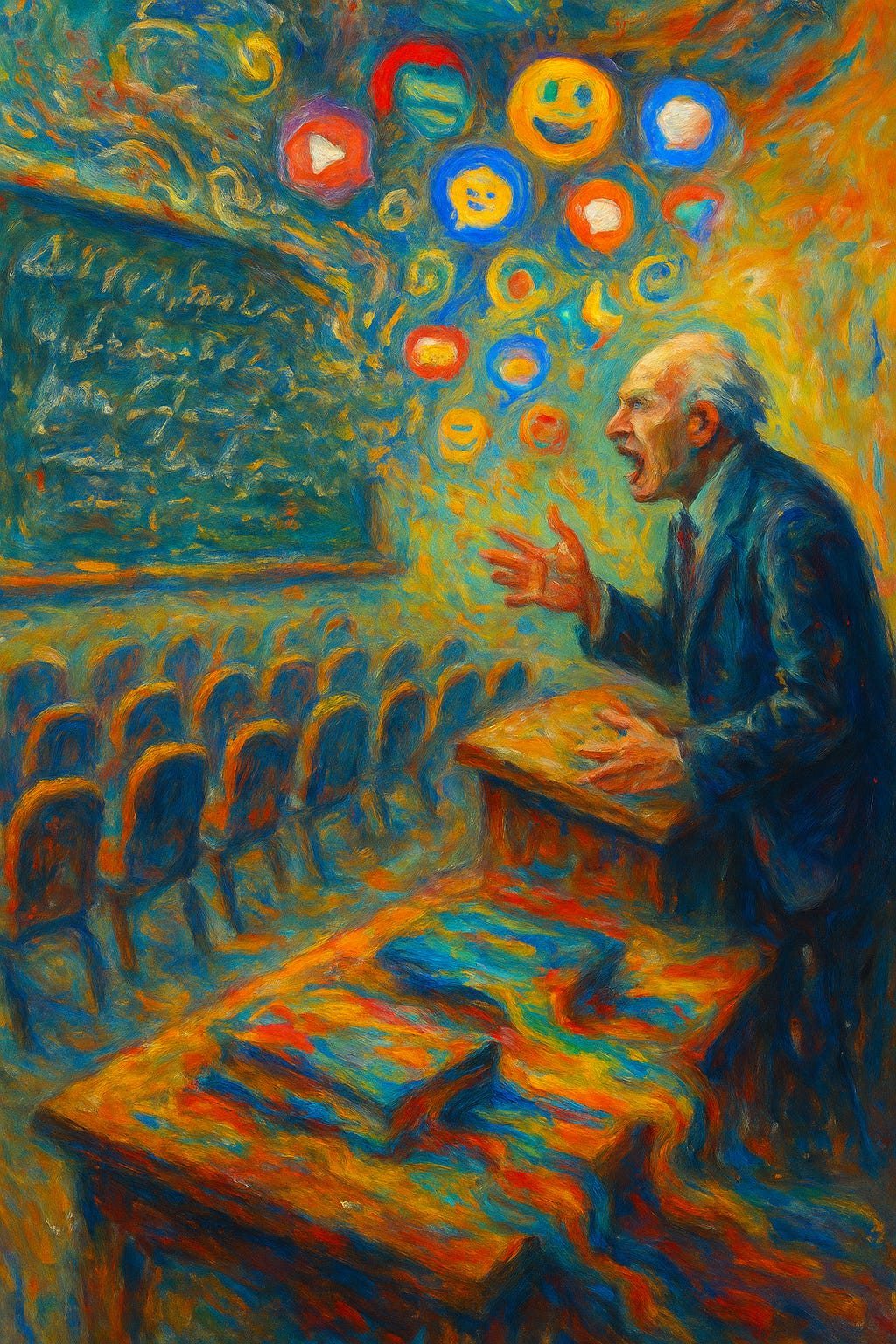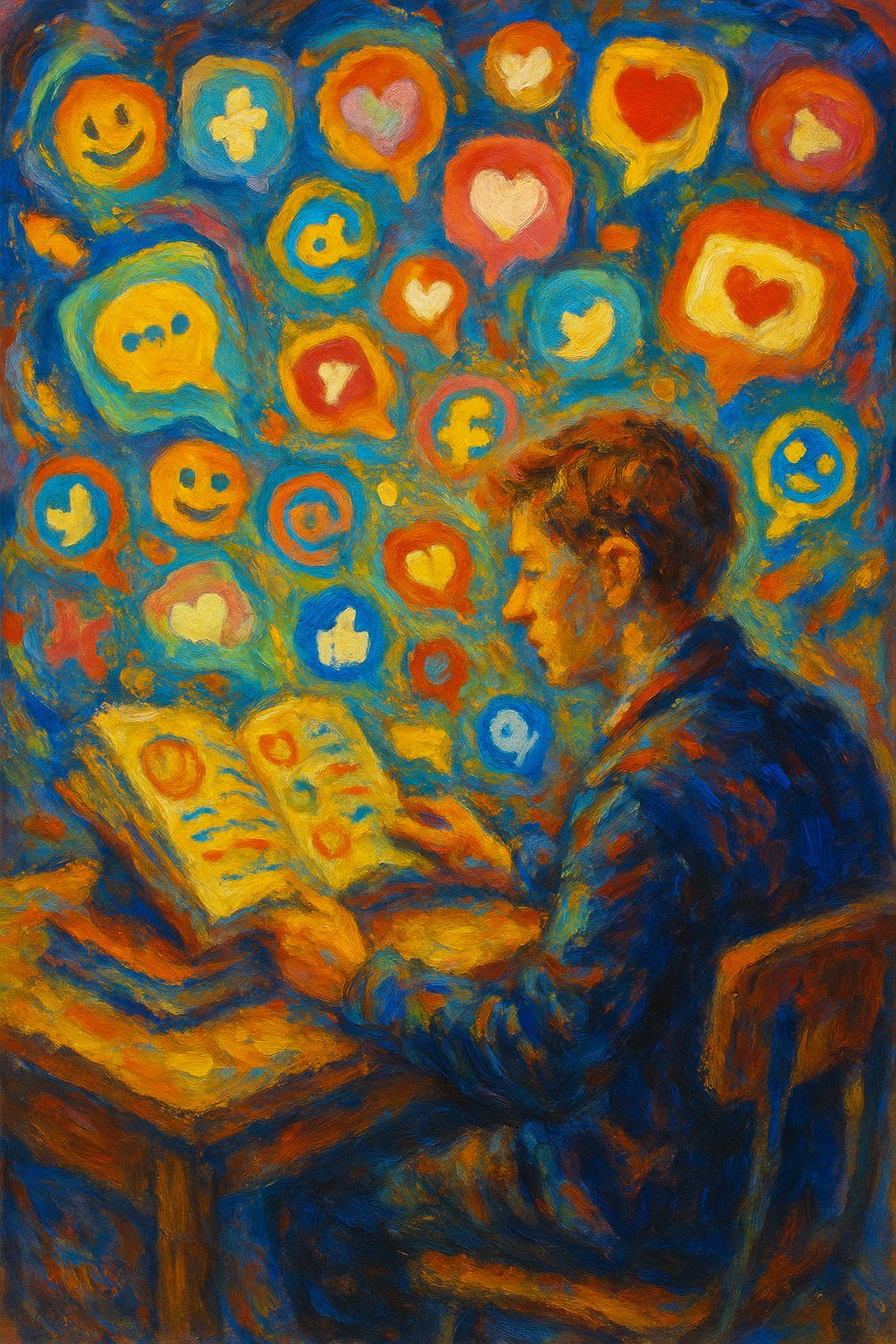The Death of the Reader
Why civilisations that stop turning pages start circling the drain
If you believe in the importance of free speech, subscribe to support uncensored, fearless writing—the more people who pay, the more time I can devote to this.
Please subscribe to receive at least three pieces /essays per week with open comments. It’s $6 per month, less than USD 4. Everyone says, "Hey, it’s just a cup of coffee," but please choose my coffee when you come to the Substack counter. Cheers.
Rewritten August 21, 2025
Preaching to the choir, of course, presumes that the purpose of preaching is to convert rather than simply to serenade those already sitting in the pews. It implies evangelisation is the point, not a liturgical karaoke session for those who already know the chorus.
And while it might stiffen the sinews of the believers, one cannot build a church solely by declaiming at the polyester-gowned choir, nor by impressing the fellow in the third pew who turns up because there’s a hot girl in the soprano section that he is fixated on.
If growth is the requirement, then growth will not come from perpetually rehearsing with those who, at least theoretically, already believe. Otherwise, you have a stagnant choir loft, resplendent in blue polyester, crooning hymns to itself until the organ wheezes its last.
And so it is in my classroom. When I stand before the few who deign to attend and begin the ritual by announcing that attendance matters—that I test from what I say, that I care nothing for PowerPoint slides, and that to skip class is to court disaster—I am not changing behaviour. I am, instead, exhaling my frustration into the ether.
The empty chairs remain empty. The truants are unmoved by my proclamations, for the simple reason that they are not present to hear them. And those who do come, those conscientious survivors who drag themselves into class, often boast—boast!—that they have not purchased the textbook, have not read the textbook, and have no intention of ever opening the textbook.
Ignorance has become a mark of pride, a jaunty fashion accessory worn with the same élan as their earbuds and hoodies.
Still, I do not stop myself. Once the complaining begins, I cannot dam the flood. I vent about the absent ones who expect to pass as an entitlement of existence. I retell, with weary relish, the story of the student who missed every class because, he explained, he never found the Zoom link.
It was, of course, an in-person class.
Yes, in those moments, I am addressing the missing. I am haranguing the invisible. But that is the nature of the age: shouting into the void.
Which brings me, inevitably, to today and the larger point: someone has to say aloud that we live in an era when fewer and fewer want to read, even among those who already have seats in the choir.
I cannot tell you how many acquaintances I have sent my Substack to, shamelessly chasing my vanity metrics, only to discover that even long-time friends—friends of decades—have never read a single essay.
My children signed up, but only on the free plan, and whether they ever read a word is a mystery. I've set a challenge for my child: if you read this by Sept. 9, 2025, at midnight, you will get fifty dollars. The prize last time went unclaimed. This is a rewrite. Take two.
Some friends don’t sign up at all. No disrespect is intended, they assure me, though forgive me if this sounds a little bitter. If the shoe were on the other foot, I would sign up for any friend’s Substack. I would do it even if the thing were clogged with recipes for gluten-free muffins or endless photographs of their four cats dressed as John, Paul, George, and Ringo. Of course, I would then proceed to delete their memes, so I am hardly saintly. But at least I would show up.
I even tried to burnish my credibility by noting, in my invitations, that many of these essays first appeared in the Globe and Mail. I thought the imprimatur of Canada’s national broadsheet might nudge them into curiosity. Alas, it backfired. It reeked of neediness. It made me sound, as my son put it with youthful bluntness, like a try-hard.
And yes, I realise I am flattering myself by assuming the explanation is benign—that they are too busy, too distracted, too digitally frazzled. The darker truth is likelier: they do not enjoy my writing, they think me dull, they may not like me at all. Or they just never read beyond 100 words.
Perhaps they regard me as the students once did, those who warned their fellows outside my classroom door to loiter at Starbucks until I wound down from yet another rant.
But my plight is hardly unique. It is the cultural air we all breathe. The larger reality is simply this: nobody reads anymore.
Pew reports that one in four Americans did not read or start a single book last year. Another survey says only 31 percent read or completed one. And even those figures, I suspect, are padded.
Admitting you don’t read books is like telling a pollster how much pornography you consume: the truth is always worse. Newspapers? Nobody reads those either. Gallup’s numbers confirm the decline. Researchers assure us that people “read online,” but that is the very problem. The Internet is the mother of all distraction platforms, the place where attention spans go to be garroted by algorithms. Reading online is like dieting in a doughnut shop.
Contrast that with 1860. You sat in your lonesome shack on the Nebraska plains, a kerosene lamp sputtering beside you. You read your book because what else was there to do? Restack the woodpile? Converse with the poker? Today, you enter your man cave. On the table lies a Russian novel with a hundred characters, a book that practically requires an Excel spreadsheet to track. Next to it sits the remote, promising three hundred streaming channels, each one ready to pour a sugar rush of moving images into your veins. Which wins? I will confess: not the Russian.
The book eventually gets shoved down into the couch cushions, where it languishes until my terriers chew it into pulp and I rediscover it while searching for the lost remote.
And the choice isn’t just Dostoevsky versus Netflix. It’s Dostoevsky versus a buffet of TikTok dances, YouTube prank channels, and professors of “media studies” inventing jargon about how scrolling endlessly is itself a form of literacy. These are the academics who will explain, without irony, that binge-watching Love Island with the captions on counts as “textual engagement.” Civilisation is always one faculty committee away from legitimising its collapse.
But does it matter? Isn’t reading merely one mode of information intake? Can’t TikTok and Twitter do the job just as well? The answer is no. A 2013 Emory University study had readers lie in MRI machines and read novels while on their backs. The more deeply they entered the story, the more their brains lit up. Neural activity soared, and what’s more, the heightened activity lingered for days afterwards. Reading, quite literally, rewires the brain.
It also strengthens attention spans. When you stop reading serious works, your mind drifts, your thoughts scatter like dandelion seeds on the wind. And no, Hardy Boys does not count as a serious work. But with practice, with immersion, you can restore the discipline—the attention returns. You do not need to double your Vyvanse dosage. Long-form reading also fosters critical thought, dragging you further down those hard, curving learning paths that resemble the mod Sixties chair you overturn in frustration while rummaging the living room for the remote.
And so here I am, near the end of this essay, convinced almost no one is still with me. I recall the writer who tucked fifty-dollar gift certificates into the bindings of his six-hundred-page novel, placing them around page four-fifty. Not a single one was ever redeemed. Nobody got that far. I cannot attempt that stunt in digital form. Besides, fifty dollars is a lot. I just got fired a month ago.
But this is not merely vanity. The danger is not just that no one is reading me; it is that no one is reading, period. If books and broadsheets fade away, if magazines and essays collapse into oblivion, we lose something irreplaceable. We lose the cadence and beauty of language arranged with care. We lose the rich pleasures of narrative and argument.
And those pleasures will not be replicated by reruns of The Voice or by influencers deep-frying their Air Jordans on YouTube. Long-form reading is supposed to create friction. It is meant to be hard. It is wrestling. It makes you sweat, it forces growth, it implants words in the memory and sinew. It makes you stronger.
A populace that doesn’t read is democracy’s soft underbelly, a pliant, distracted clay in the hands of demagogues. Reading is democracy’s training ground, and its erosion is its undoing. When the habit of reading collapses, logic goes with it, and the citizenry is left disarmed—incapable of distinguishing between a reasoned argument and a shouted slogan.
Consider what’s happened over the last two decades: leisure reading has plummeted. The printed page has been traded for scrolling, swiping, and binge-watching. Books require patience and an attention span; TikTok requires neither. The result? A body politic that confuses opinion with knowledge and treats civic duty as just another form of “content consumption.”
Libraries, once shrines of inquiry, are now treated like museums of a lost art, underfunded, attacked, or simply abandoned. The fewer books people read, the easier they are herded by noise.
As one scholar put it, deep reading isn’t a hobby; it’s a civic immune system. It builds abstract and analytical muscles, inoculating us against prejudice, conspiracy theories, and the soft totalitarianism of cliché.
History provides its warnings. The Catholic Church’s greatest fear during the Middle Ages wasn’t heresy—it was literacy. The heretic could be burned, but the literate peasant was dangerous in a way no bishop could contain. Once you can read for yourself, you stop depending on the priest to tell you what the book says. Likewise, once a citizen can think for himself, he stops depending on the demagogue to explain the world.
Without books, democracy curdles into a spectacle. Politics becomes reality television: leaders perform, citizens applaud or boo, and nothing is remembered beyond the hashtags. Reading demands friction and labour; it resists the flattening of thought into memes. Lose that, and you don’t get tyranny of the illiterate—you get tyranny of the distracted, a society that can’t even remember what it’s lost.
Long-form reading is not some quaint indulgence, like restoring a Victrola. It is the scaffolding of liberty itself. Without it, the republic doesn’t merely weaken; it calcifies, ossifies, and finally collapses under the weight of its slogans. And when the dust settles, the universities will still be here, proudly offering their courses in Meme Studies.
We will trade the broadsheet for the hashtag, the essay for the meme, and the serious novel for the endlessly recycled superhero sequel. That is not progress.
Soon, the very idea of deep reading will be not just unfashionable but incomprehensible.
“You mean,” the undergraduate of 2040 will ask, squinting into his headset, “you just sat there… and stared at words?” And the faculty senate, which once conferred doctorates in history and literature, will nod along as it proudly votes to establish the new Department of Meme Studies.









"Your essay eloquently captures the irreplaceable value of long-form reading in a digital age. The tactile pleasure of books and the mental stimulation they offer are experiences we must cherish and preserve. Let's not lose these treasures to the fast pace of modern life."
I’m appalled when supposedly otherwise intelligent people tell me - and this has happened more often than you’d think- that they haven’t read a book since graduating university (as long as a decade ago!) and they’re proud of it, as if it is an accomplishment.
Anyway, as Anthony Powell put it, “books do furnish a room.”